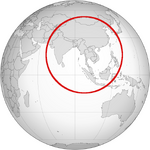Another thread prompted the OP question - Why do Non-Christians vastly outnumber Christians?
According to
 List of religious populations
List of religious populations out of roughly 7.8 billion religionists, Christians are about 31% of that total (which excludes atheists).
Why do you think that is?
Why wouldn't they? Christianity never had much purchase in the most densely populated regions of our world.
What explains Christianity’s lack of success there?
We're talking about an enormous area of land, people, and cultures, and I don't think there's a universal answer that would apply to all of it. Especially as we're talking about an issue, religious identity, that is only partially social in nature.
But if we must speculate, knowing that we are speculating, here are some possible factors to consider:
- European colonization largely failed in those places. China, Korea and Japan resisted foreign influence almost altogether. India and Southeast Asia were politically dominated for a short period of time, but ultimately threw off their shackles before a christonormative cultural hegemony had time or even license to form.
- A lot of the rhetoric Christian missionization uses has less obvious appeal for someone already belonging to an Axial Age religion founded on consensus reverence for a group of ancient texts, as per all of the Vedic faiths that are dominant in those same nations, and syncretic Taoism. There is no Holy-Book-shaped hole in a Taoist's life, and indeed a lot of central Christian ideas would come across as duplicate concepts. The incarnation of Jesus doesn't seem as remarkable to a Hindu, and indeed if you've grown up believing that your traditions are older, a lot of Jesus stories sound like bargain-basement knockoffs of the Krishna stories you already know.
- I think a common cultural preference for pluri-religiosity is also a (related) factor. In the absence of a state-backed Church to tell them not to, your average Buddhist or Taoist who felt compelled to say a prayer to Jesus, or add a niche for him in the family stupa, or add his avatar to the list of names in your mantra for another Deva, etc, they would would just do so. No need for conversion, just addition.
- In some places, competition with other more appealing Western philosophies is a factor. Marxism and (public) religiosity mix about as well as fire and water. "Opiate of the Masses", I believe is the popular mantra? Islam, likewise. There's a preset place for Christianity in the social world of the Dar-al-Islam, and it isn't a
great place.
- It matters, too, what has come to be associated with "modernity" and the corresponding benefits of international trade and exchange. In, say, Luganville, San Sebastian, or Mbale, participation in the local church is your connection to important people, your passport to global exchange and technology. In Tianjin it would only be a additional barrier isolating you from that same exchange.
 List of religious populations out of roughly 7.8 billion religionists, Christians are about 31% of that total (which excludes atheists).
List of religious populations out of roughly 7.8 billion religionists, Christians are about 31% of that total (which excludes atheists). 
